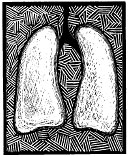DMS radiologist cochairs national lung cancer trial
The nation's largest-ever screening trial for lung cancer—a disease that kills 155,000 Americans a year—was launched a few months ago with considerable fanfare and has now begun to enroll 50,000 current and former smokers at 30 sites across the country. William Black, M.D., a professor of radiology at Dartmouth, is one of five cochairs of the study and was involved in developing the protocols for the massive trial.
Lives: "Lung cancer kills more people than cancers of the breast, prostate, colon, and pancreas combined," notes Black. "Our hope is that this study will lead to saving lives."

|
|
Cancer of the lung is the focus of a massive
new national trial; a radiologist
at Dartmouth is one of its cochairs. |
President George Bush and four-time Tour de France winner Lance Armstrong announced the trial at a White House event in September that highlighted anticancer efforts. The study is designed to determine if screening people with either spiral CT scans or standard chest x-rays, before there is any evidence of symptoms, can reduce deaths from lung cancer.
"There are more than 90 million current and former smokers in the United States at high risk for lung cancer, and death rates for this disease, unlike many other cancers, have not declined," notes the National Cancer Institute's John Gohagan, Ph.D., codirector of the National Lung Screening Trial (NLST). Participants —current or former smokers between the ages of 55 and 74—will be randomly assigned to receive either a chest x-ray or a spiral CT once a year for three years. Researchers will continue to contact participants annually, to gather follow-up health information, through 2009.
Spread: Today, by the time it is detected, lung cancer has spread outside the lung in 15% to 30% of those diagnosed with the disease. Spiral CT, a technology introduced in the 1990s, can pick up tumors well under 1 centimeter in diameter, while chest xrays can detect 1- to 2-centimeter tumors. Spiral CT uses x-rays to scan the entire chest quickly, in about 15 to 25 seconds; then a computer assembles the images into a three-dimensional model of the lungs. The more sophisticated technology has some drawbacks, however. Its findings are less specific than those of an xray, and a spiral CT costs four to five times more than a standard chest x-ray.
More than half of the hospitals in the United States own a spiral CT machine and routinely use it for "staging" lung and other cancers—that is, determining how advanced a cancer is after it is diagnosed.
Some hospitals have also begun performing spiral CT scans in the hope of finding early lung cancer in smokers and former smokers. However, no scientific evidence to date has shown that lives are actually saved as a result of screening or early detection of lung cancer, using either spiral CT or chest x-rays.
"Conventional wisdom suggests that the smaller the tumor when it is found, the more likely the chance of survival—but that remains to be proven," says the NLST's other codirector, Denise Aberle, M.D. "Because of the number of individuals participating and because it is a randomized, controlled trial, NLST will be able to provide the evidence needed to determine whether spiral CT scans are better than chest x-rays at reducing a person's chances of dying from lung cancer."
Three of the 30 NLST sites— all of which are National Cancer Institute-designated comprehensive cancer centers—are located in New England. In addition to Dartmouth's Norris Cotton Cancer Center, they are Beth Israel Deaconess Medical Center and Brigham and Women's Hospital, both in Boston.
Rank: According to the National Cancer Institute, Maine, New Hampshire, and Vermont all rank above the 50th percentile in lung cancer mortality per 100,000 population.
Alan Smithee
If you would like to offer any feedback about this article, we would welcome getting your comments at DartMed@Dartmouth.edu.
